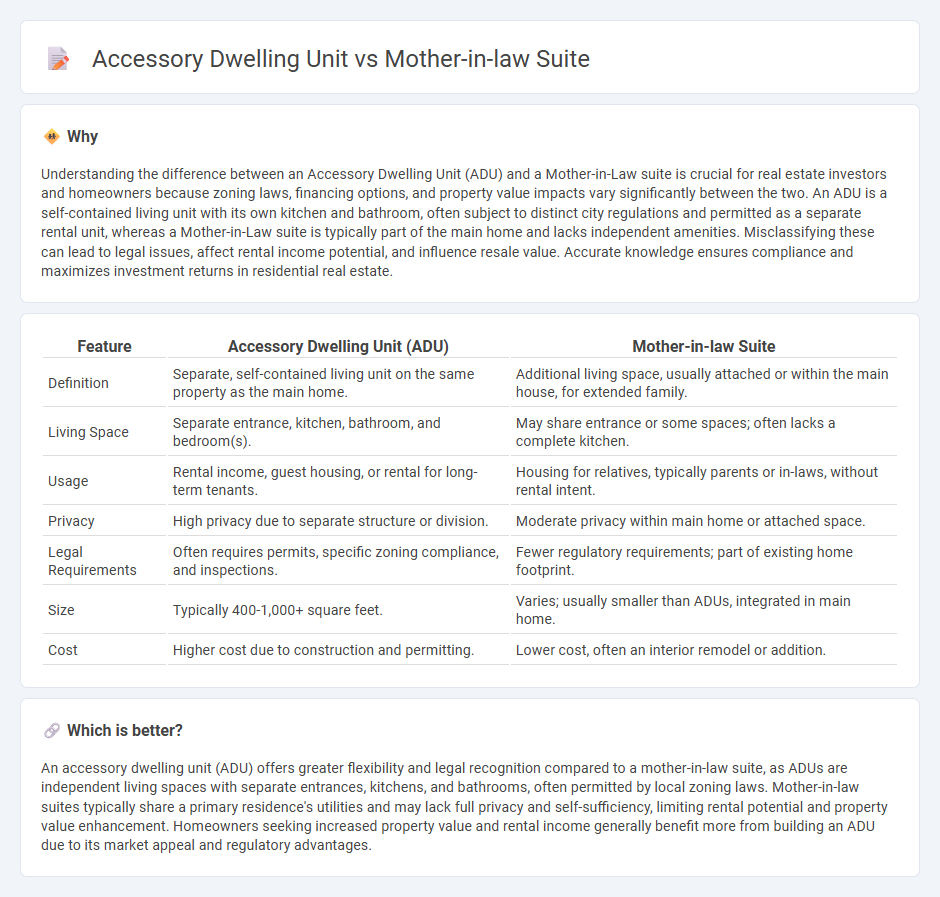
Accessory dwelling units (ADUs) are self-contained living spaces typically built on the same property as a primary residence, offering independent amenities and private entrances. Mother-in-law suites, often integrated within the main house or as attached spaces, provide additional living quarters designed for extended family members but may share some utilities. Explore the key differences and benefits of ADUs versus mother-in-law suites to determine the best fit for your real estate needs.
Why it is important
Understanding the difference between an Accessory Dwelling Unit (ADU) and a Mother-in-Law suite is crucial for real estate investors and homeowners because zoning laws, financing options, and property value impacts vary significantly between the two. An ADU is a self-contained living unit with its own kitchen and bathroom, often subject to distinct city regulations and permitted as a separate rental unit, whereas a Mother-in-Law suite is typically part of the main home and lacks independent amenities. Misclassifying these can lead to legal issues, affect rental income potential, and influence resale value. Accurate knowledge ensures compliance and maximizes investment returns in residential real estate.
Comparison Table
| Feature | Accessory Dwelling Unit (ADU) | Mother-in-law Suite |
|---|---|---|
| Definition | Separate, self-contained living unit on the same property as the main home. | Additional living space, usually attached or within the main house, for extended family. |
| Living Space | Separate entrance, kitchen, bathroom, and bedroom(s). | May share entrance or some spaces; often lacks a complete kitchen. |
| Usage | Rental income, guest housing, or rental for long-term tenants. | Housing for relatives, typically parents or in-laws, without rental intent. |
| Privacy | High privacy due to separate structure or division. | Moderate privacy within main home or attached space. |
| Legal Requirements | Often requires permits, specific zoning compliance, and inspections. | Fewer regulatory requirements; part of existing home footprint. |
| Size | Typically 400-1,000+ square feet. | Varies; usually smaller than ADUs, integrated in main home. |
| Cost | Higher cost due to construction and permitting. | Lower cost, often an interior remodel or addition. |
Which is better?
An accessory dwelling unit (ADU) offers greater flexibility and legal recognition compared to a mother-in-law suite, as ADUs are independent living spaces with separate entrances, kitchens, and bathrooms, often permitted by local zoning laws. Mother-in-law suites typically share a primary residence's utilities and may lack full privacy and self-sufficiency, limiting rental potential and property value enhancement. Homeowners seeking increased property value and rental income generally benefit more from building an ADU due to its market appeal and regulatory advantages.
Connection
Accessory dwelling units (ADUs) and mother-in-law suites both function as secondary living spaces on a single residential property, providing independent accommodations for family members or tenants. These structures enhance property value and offer flexible housing solutions, often used for multigenerational living or rental income. Local zoning regulations commonly govern the size, placement, and usage of ADUs and mother-in-law suites to ensure compliance with residential standards.
Key Terms
Separate Living Quarters
A mother-in-law suite is a specific type of separate living quarters typically attached or integrated into a primary residence, designed for extended family members. An accessory dwelling unit (ADU) is a broader category encompassing fully independent living spaces, often with separate entrances, kitchens, and utilities, allowing more privacy and autonomy. Explore detailed differences and benefits of both options to determine the best fit for your living arrangements.
Zoning Regulations
Mother-in-law suites typically refer to smaller, self-contained living spaces within or attached to a primary residence, while accessory dwelling units (ADUs) are independent housing units on the same property but with their own entrance and amenities. Zoning regulations often differ, with ADUs subject to specific local ordinances that dictate size limits, occupancy, and utility connections, whereas mother-in-law suites may fall under traditional residential use without requiring separate permits. Explore the nuances of local zoning codes to determine which option aligns with your property's legal framework and housing goals.
Independent Utilities
A mother-in-law suite typically shares utilities with the main house, limiting independence and potentially increasing utility costs or billing complexities. Accessory dwelling units (ADUs) often have separate utility connections for water, electricity, and gas, promoting self-sufficiency and privacy. Explore our detailed guide to understand how independent utilities can impact property value and living convenience.
Source and External Links
What is a Mother-in-Law Suite? - A mother-in-law suite is a separate living space--often with its own entrance, bathroom, bedroom, and kitchen--attached to, inside, or on the same property as a primary residence, suitable for extended family or rental purposes.
What is a Mother-in-Law Suite? - Mother-in-law suites come in several forms, including interior spaces within the main house, attached additions, and fully detached ADUs, each offering privacy and autonomy for occupants while providing flexibility in use and potential rental income.
What Is a Mother-in-Law Suite, and Should I Consider ... - Typically featuring at least a bedroom and bathroom, often with a separate entrance and kitchen, mother-in-law suites are designed to provide comfort and privacy, making them popular for multigenerational living and cost-saving arrangements.
 dowidth.com
dowidth.com